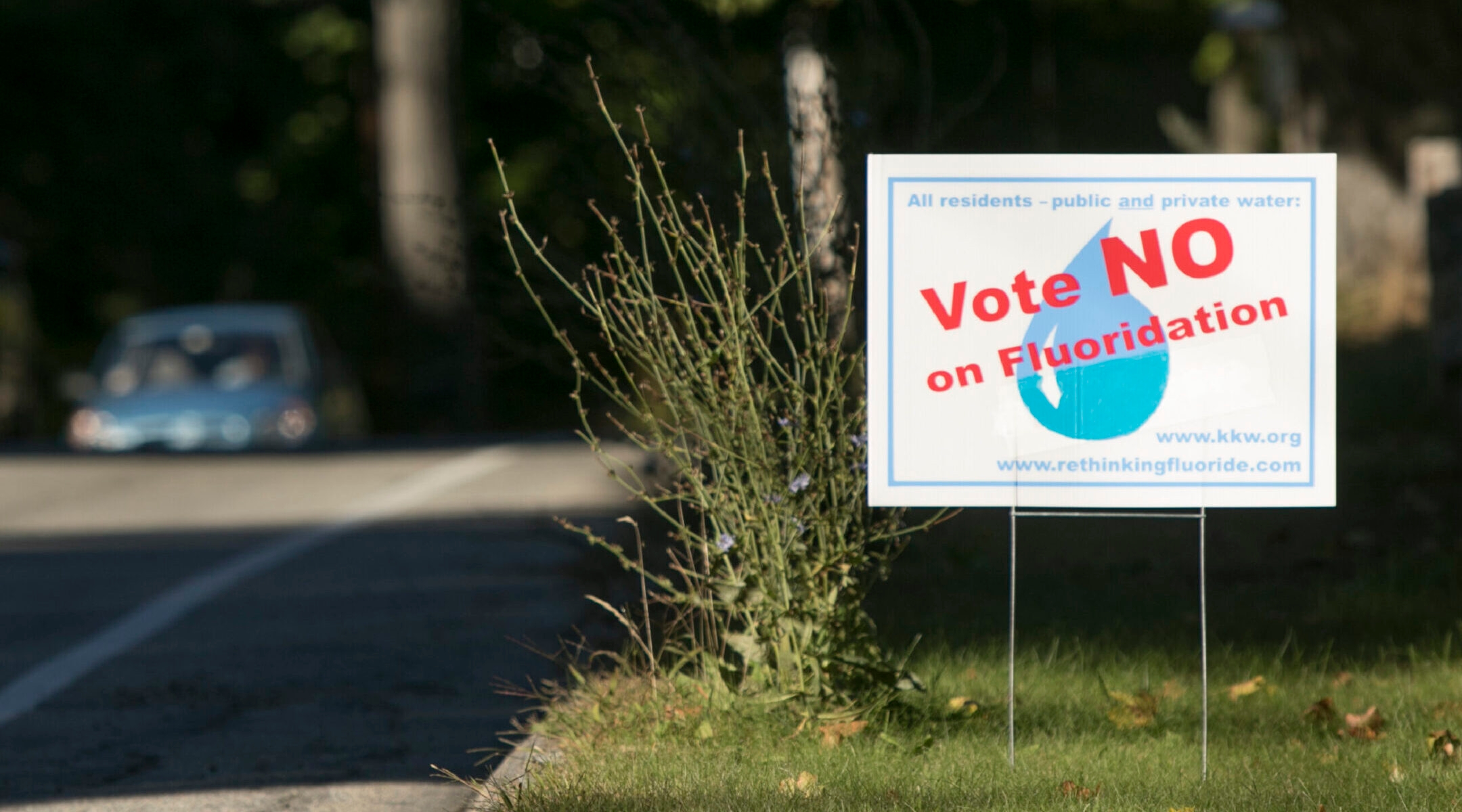RFK Jr. Urges Fluoride-Free Water: Lessons from Israel’s Decade of Change!



TEL AVIV — Ilana Decker, who made the leap from Israel to New York just three years back, finds herself at an unexpected crossroads of opinion with Robert F. Kennedy, Jr. While she doesn’t often resonate with his views—especially his stance against government health mandates, which she feels unfairly brands her as an anti-vaxxer—there’s one issue where their perspectives converge. It’s about the man Donald Trump has tapped for the next Health and Human Services secretary, who has openly suggested shaking up a decades-old practice: fluoridating America’s drinking water.
Decker stands firmly in favor of this shift, drawing from her own experiences; her homeland of Israel has not added fluoride to its water for the last decade. “I cringe at the thought of aligning with RFK Jr., but on this, I’m with him 100%—fluoride shouldn’t be in our water,” she admits. Her apprehension is palpable as she discusses her young child; she made the switch to fluoride-free toothpaste, although she hasn’t completely ruled out fluoride’s benefits.
“I have a profound distrust in the government’s ability to dictate our health choices ‘for our own good,’” Decker expresses. “Sure, I can opt for fluoride toothpaste, but I don’t have the choice to avoid the water that flows from my tap.”
The nomination of Kennedy, a prominent anti-vaccine advocate and vocal critic of governmental health entities, has ignited a broader dialogue about public health governance—particularly regarding the increasing skepticism towards scientific consensus and its implications for policy-making.
Fluoridation serves as a prime example of this contentious debate. According to the U.S. Centers for Disease Control and Prevention, community fluoridation has been shown to reduce cavities by approximately 25% over a lifetime, earning its title as one of the “ten great public health achievements of the 20th century.”

Protestors against fluoride gathered outside the Department of Public Health in Sydney, Australia, back in 1966. (Frank Albert Charles Burke/Fairfax Media via Getty Images)
Yet, there’s a dissenting chorus pointing to studies indicating that excessive fluoride—well above standard levels—could contribute to developmental issues in children. Add to that a whirlpool of conspiracy theories suggesting that fluoride is part of a government ploy to control the populace. Kennedy has dubbed fluoride an “industrial waste” and a “dangerous neurotoxin,” promising to halt its addition to water supplies on “day one” if he takes office. He argues that the choice to use fluoride should lie with individuals, not imposed by the government.
“I believe fluoride is on its way out,” Kennedy declared on NBC News shortly after Trump’s recent election. “The quicker we get rid of it, the better it will be.”
This ongoing debate echoes the decision made by Israel in 2013 to cease water fluoridation, a move that could provide insights into how the U.S. might navigate a similar path. In Israel, where public health officials now grapple with rising dental issues in children, there are calls to reintroduce fluoride, while American cities may be gearing up to do the opposite.
“The history of water fluoridation stands as a testament to public health success, and the push against it should serve as a cautionary tale,” warns Shlomo Zusman, a former chief dental officer in Israel who opposed the 2014 policy shift.
He emphasizes that modern water treatment methods are diverse, and merely removing fluoride doesn’t mean water is untouched—it’s all carefully treated. “The notion that fluoride-free water is ‘natural’ is a misconception; our water is no longer sourced from springs,” he says, referencing biblical times. “Those days are long gone.”
Fluoride became a staple of Israeli public health policy decades ago, inspired by early American initiatives. An Israeli Health Ministry page even praised fluoridation as the “most effective, safest, simplest, and cheapest way” to combat dental diseases. However, in 2013, the health minister, Yael German, decided to stop mandating it, citing concerns from unnamed doctors about potential risks to pregnant women and the elderly. German echoed Kennedy’s sentiment about individual choice, stating, “I believe that continuing to fluoridate all water was a mistake.”
Subsequent administrations have proposed reinstating fluoride, yet it remains absent from Israeli water supplies. In the aftermath of halting fluoridation, Israeli dentists have noted a troubling increase in cavities among children, leading to calls for a reversal of the decision, though resistance persists among some parents.
Recent studies highlight a significant rise in dental restorations among Israeli children since fluoride was removed. A September report concluded that the absence of fluoride has led to worsening dental health, while another study from early 2022 indicated that children aged 3 to 12 required nearly double the restorative treatments compared to previous years. These findings cast doubt on the effectiveness of Israel’s free dental care initiatives.
The conversation around fluoridation is not confined to Israel. In Juneau, Alaska, the elimination of fluoride in 2007 led to declining pediatric dental health, as revealed in a study focused on disadvantaged children’s dental treatment needs. Similarly, Calgary, Canada, experienced increased cavity-related treatments after ceasing fluoridation in 2011 and has now opted to reinstate it. Yet, many municipalities across the U.S. have moved away from fluoride, some even through voter referendums in recent elections.

Opponents of fluoride rallied against a 2016 referendum that would determine the future of fluoride in seven Maine towns. (Gregory Rec/Portland Portland Press Herald via Getty Images)
In contrast, much of Europe has either never embraced or has abandoned fluoridation, opting instead for alternatives like fluoridated salt and milk, which bridge the gap of fluoride deficiency in water supplies.
This divide in public opinion persists in Israel, where some mothers believe that the country’s cavity epidemic stems more from dietary choices and poor hygiene than the absence of fluoride. “Kids living on white bread and chocolate spread aren’t helping,” one mother commented in a Facebook group. Another teacher noted a drastic decline in children’s nutrition, attributing the dental crisis to dietary factors rather than fluoride absence. “It’s no surprise the rise in cavities coincides with the deterioration of children’s diets,” she stated.

Sweets abound at Carmel Market in Tel Aviv, a reflection of local dietary habits. (Beata Zawrzel/NurPhoto via Getty Images)
Concerns about fluoride’s impact on health are far from settled. A recent study from the National Institutes of Health’s National Toxicology Program suggests that high fluoride exposure might correlate with lower IQs in children. However, the study affirms the dental benefits of fluoride while acknowledging that the levels studied far exceeded recommended concentrations in U.S. drinking water.
Another study from earlier this year uncovered a link between prenatal fluoride exposure and behavioral issues in children, although the authors stopped short of establishing a direct cause-effect relationship.
Zusman, who remains unconvinced by the growing list of health concerns, views these worries as a passing trend. “There was a time when people blamed fluoridation for hip fractures, then cancer, and later stunted growth in boys,” he recalls. “Now, it’s ADHD and IQ—they shift the blame to fluoridation for everything.”
For Zusman, the issue resonates deeply; he has eight grandchildren to think about. “If credible studies emerged showing harm, I’d be the first to advocate for stopping water fluoridation,” he states confidently. “My family’s health is my greatest concern.”
Keep Jewish Stories in Focus.
For over a century, we’ve chronicled Jewish history in real-time. Support independent, award-winning journalism and help us continue our mission.






